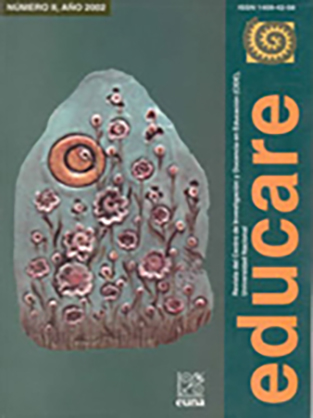Reflexiones en torno al fracaso escolar
DOI:
https://doi.org/10.15359/ree.2002-2.3Abstract
This article analyzes a matter of vital importance in the current educational context: school failure.
Some ideas, concepts, and experiences that are actively involved in this social problem are reviewed from different sources, and summarized, from a theoretical viewpoint.
This text is divided in sections that overview the main notions on school failure magnitude of the problem in Costa Rica, associated aspects and variables derived from studies and observations among the educational and social system, and also through the family patterns and personal ways of dealing with it. This sections postulate innovative and traditional ways to visualize this problem from a holistic and multicausal perspective; proposing an interdisciplinary work to deal with an educational world full of changes and challenges.References
Alfaro A. Arce P. Solís K. y Vargas L. (1997). Algunos factores
psicosociales asociados a la repitencia y la deserción en I y II ciclos. Ministerio de Educación Pública, Departamento de Orientación y Vida Estudiantil. Código 64975 - CIDENAF. Costa Rica.
Brenes, G. (1997). "Entidades psiquiátricas que interfieren en el
rendirrúento escolar". En: Memoria /[Seminario Nacional sobre Rendimiento Escolar. INEINA- CIDE - UNA. Heredia, Costa Rica.
De la Serna, L. (1995). "Fracaso Escolar. ¿De quién es la culpa?, ¿del
niño, del maestro o de los padres?". En: Familia Cristiana. No. XXX. Argentina.
Flores, C. (1991). "La Psicología educativa ante el fracaso escolar". En: Revista Costarricense de Psicowgía.. No. 19, pags. 69 -78. San José, Costa Rica.
Martínez, M. (1997). "Consideraciones Clínicas en torno al Rendirrúento Escolar". En: Memoria II Seminario Nacional sobre Rendimiento Escolar. UNACIDE-INEINA
Massino, A. (1995). "Repetición escolar en la enseñanza primaria: una
perspectiva global". En: Revista Argentina de Psicopedagogía. Año 11, No. 38 (2da etapa), invierno 1995. pp. 28 - 42. Buenos Aires, Argentina.
MEP. (2000) Repetición en el sistema educativo costarricense, 1999. San José, Costa Rica
Oficina Internacional de la Educación de la UNESCO. (s.f). "La repetición escolar en la enseñanza primaria: una perspectiva global". En: Novedades Educativas. No. 65. Año 8. Argentina. Pág. 44.
Pazos, C. (1991). ·"Niños pobres en la escuela. ¿Un fracaso inevitable?". En: Gurises Unidos. Vol 2. No. 4. Agosto p.4 (1) id.
Pernudi, V. ( 1997). "Rendimiento Académico: habilidades, cognoscitivas y afectivas". En: Memoria II Seminario Nacional sobre Rendimiento Escolar. UNA-CIDE-INEINA Heredia, Costa Rica.
Rosales, J. (1987). Promoción, repitencia, deserción y desperdicio en
educación primaria y secundaria. Centro de Información Computarizada. OEA.
Sautu, R. (1995). "Escolaridad y futuro". En: Oikos: Revista de posgrado, Investigación y Doctorado. Año 3, No. 7 - Abril. Facultad de Ciencias Económicas, Universidad de Buenos Aires, Argentina.
Published
How to Cite
Issue
Section
License
1. In case the submitted paper is accepted for publication, the author(s) FREELY, COSTLESS, EXCLUSIVELY AND FOR AN INDEFINITE TERM transfer copyrights and patrimonial rights to Universidad Nacional (UNA, Costa Rica). For more details check the Originality Statement and Copyright Transfer Agreement
2. REUTILIZATION RIGHTS: UNA authorizes authors to use, for any purpose (among them selfarchiving or autoarchiving) and to publish in the Internet in any electronic site, the paper´'s final version, both approved and published (post print), as long as it is done with a non commercial purpose, does not generate derivates without previous consentment and recognizes both publisher's name and authorship.
3. The submission and possible publication of the paper in the Educare Electronic Journal is ruled by the Journal’s editorial policies, the institutional rules of Universidad Nacional and the laws of the Republic of Costa Rica. Additionally, any possible difference of opinion or future dispute shall be settled in accordance with the mechanisms of Alternative Dispute Resolution and the Costa Rican Jurisdiction.
4. In all cases, it is understood that the opinions issued are those of the authors and do not necessarily reflect the position and opinion of Educare, CIDE or Universidad Nacional, Costa Rica. It is also understood that, in the exercise of academic freedom, the authors have carried out a rogorous scientific-academic process of research, reflection and argumentation thar lays within the thematic scope of interest of the Journal.
5. The papers published by Educare Electronic Journal use a Creative Commons License:














 The articles published by Educare Electronic Journal can be shared with a Creative Commons License:
The articles published by Educare Electronic Journal can be shared with a Creative Commons License: 



